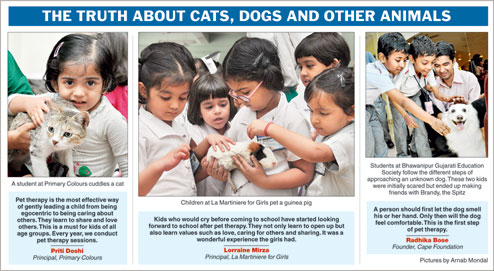 |
Mary may have broken rules by taking her little lamb to school, but students in city schools are being encouraged to make friends with cats and dogs, geese and guinea pigs and even mice who come visiting on the campus.
If Mickey the golden retriever turned out to be a big hit at La Martiniere for Girls, Brandy the happy-go-lucky Spitz had students at Bhawanipur Education Society pampering her, while toddlers at Primary Colours were eager to cuddle Kitkat and Puchi the cats during pet therapy sessions in their school.
“Stress has become a part of our lives and even children are not spared. Having a pet is a great stress-buster,” said Radhika Bose, the founder of Cape Foundation, which has conducted meet-and-greet sessions with pets for students at several city schools.
Teachers and principals agree. “Kids who would cry before coming to school have started looking forward to school after pet therapy. They not only learn to open up but also learn values such as love, caring for others and sharing. It was a wonderful experience the girls had,” said Lorraine Mirza, the principal of La Martiniere for Girls.
Pet therapy at Bhawanipur Gujarati Education Society began with Radhika sharing a few tips on how to make friends with dogs. “A person should first let the dog smell his or her hand. Only then will the dog feel comfortable. This is the first step of pet therapy,” she explained.
Simran Gupta, a Class IX student at Bhawanipur Education Society, loved patting the dogs. “I had a Labrador called Bruno and he was my best friend. Whenever I was in a bad mood, spending time with Bruno would lift my spirits and I would be happy once again,” smiled the girl, who misses her favourite pet.
Pets can do much more than just ease stress, they can be the perfect companion for the ailing and also persons with disabilities. Tarunika Ghosh was detected with blood cancer, hydrocephalus and meningitis when she was just 18 months old. She grew up to be a recluse in school and at home and the only times she smiled was when she was with her pet puppy. “She had stopped interacting with people and was detected with attention deficit hyperactivity disorder,” said the girl’s father, Sanjeev Ghosh, corporate general manager, Spring Club. At Primary Colours, pet therapy sessions helped Tarunika, now in Class II, come out of her shell.
J.R. Ram, consultant psychiatrist, confirmed the healing powers of animal-assisted therapy. “Pet therapy cannot cure cancer patients but ease the pain. Pets distract the patient and that’s how they feel less pain,” he said.
Sunny, a 12-year-old cockatiel, gave Priyanka Mallick the willpower to recover from prolonged fever. “I always had hundred per cent attendance in school and was proud of it but I fell ill towards the middle of Class V and had to miss classes,” recalled Priyanka, now 22. She slipped into depression and medicines stopped working till the doctor treating her recommended pet therapy. “It was Sunny who helped me recover. I suddenly wanted to get well soon as he was my responsibility and I had to take care of her.”
Aarav Mahipal, who was hyperactive, benefited from cats, while Toshi Karan came out of depression with the help of her dog Rambo, a German Spitz. “My son could not concentrate. He just could not sit at one place for long. Since he spent most of the time in school, his problem was first discovered by his school teachers,” said the two-year-old’s mother, Neha Mahipal.
Priti Doshi, the principal of Primary Colours, introduced Aarav to pet therapy sessions and the change was evident. “He now finishes the work he is doing, whether it is solving puzzles or colouring. He has also started socialising,” the principal said.
Birla Industrial and Technological Museum’s adopt-a-pet scheme allows children to take home a pet for a month and has been very popular. “For just Rs 200, they can adopt an animal for a month. It’s refreshing for the child and the animal gets a home,” said Gautam Seal, technical officer at BITM.
Persons with autism, too, are likely to benefit from pet therapy and Cape Foundation will soon start working with autistic children at Indian Institute of Cerebral Palsy (IICP). “Pets are a kid’s best friend. They can be very therapeutic. Many people have brought dogs to our institution and it helped the kids to open up. They look forward to their visit. Cape Foundation will be conducting animal-assisted therapy with dogs, rabbits, goats and birds. We feel it will be of great help,” said Subhra Chatterjee, deputy director, communications and resource mobilisation, at IICP.
“The main problem children with autism face is that they find it hard to relate to people. When these children have a pet, they develop a bond with them and start to socialise. Also, actions such as gripping the dog’s tail or combing the fur can help improve motor co-ordination, another problem associated with autism,” said psychiatrist Ram.










